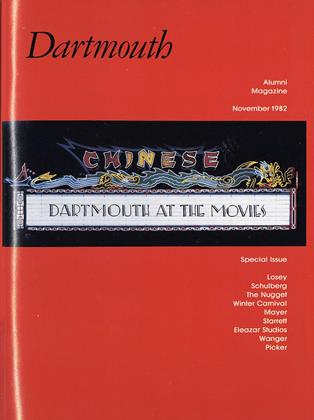This time the hue and cry is over anti-Semitism. Incidents on campus are being reported locally and nationally as possible evidence of an, anti-Semitic climate at Dartmouth without real warrant, according to Rabbi Michael Paley, associate chaplain at the College.
The Jewish festival of Succoth is celebrated in October by the building of a temporary structure commemorating the fall harvest and the wanderings of the Jews in the desert after their liberation from Egyptian slavery. For the past decade, the Dartmouth Jewish community has erected annually such a structure, known as a succah, outside College Hall. In it, over the seven-day period of the festival, Jews eat meals, offer prayers, study the Book of Ecclesiastes, and sometimes spend the night. This year, the succah was built as usual a temporary shelter made of plywood roofed with leafy branches and adorned with cornstalks, gourds, and cranberries.
On the Friday of Succoth week, a satirical article entitled "Grin and Beirut" appeared in the Dartmouth Review with a photograph of the succah. The piece, written by two Jews on the Review staff, likened the structure to Israeli settlements on the West Bank. "At least ten people came up to me after the article appeared," said Paley, "and predicted that the succah would be torn down."
It was, on October 13. The vandals responsible have not yet been identified, though the College is investigating the incident in an attempt to discover whether the destruction was random or anti-Semitic. Paley's analysis is more complex. He feels that the act is linked also to what he sees as a tendency of some members of the Dartmouth community to consider the Review their guiding light. The student authors of "Grin and Beirut" contended that their article was a harmless piece of wit and that any reader who took it seriously would have to be "pretty stupid."
Paley suggested the authors had been unwise in trying to peddle an "in" joke in a general publication, where it suffered from incendiary ignorance; but he does not feel the vandalism was a direct expression of anti-Semitism: "I don't think it means there is anti-Semitism on this campus," he said, adding, "any more than there is any other place in the world." He feels that Dartmouth is consciously hospitable to Jews and that the Jewish community here is "strong, active, nourishing, and something both the Jewish alumni and the College in general should be proud of."
Paley stressed the difference between Dartmouth and Yale, where a similar succah destruction occurred this year. At Yale, according to Paley, it was labeled "a random act," and a second succah was erected only to suffer the same fate as the first. "Here," said Paley, "there has been nothing but sympathy from everybody on campus, president to employees." He went on to point out that the College's Jewish community is, however, small: Dartmouth does have the lowest Jewish enrollment in the Ivy League. "Therefore," Paley said, "the connection between Jew and non-Jew here is limited by our numbers, and that leads to ignorance from lack of contact."
The national furor over possible anti-Semitism at Dartmouth concerns Paley, because, as he put it, "Dartmouth has, unfortunately, a reputation as a place inhospitable to Jews, a reputation that has not caught up to the modern reality, which is that it is quite hospitable. Welcoming, in fact. It's important to communicate that to alumni. The only way to move from the present condition of ignorance is to get more Jews here. I don't mean that the College needs to admit more Jews. A sizeable percentage of Dartmouth bids go out to Jewish students. I mean that more Jews need to decide to accept those bids."
 View Full Issue
View Full Issue
More From This Issue
-
 Feature
FeatureThe Credits
November 1982 By Rob Eshman '82 -
 Feature
FeatureThe Hollywood Connection
November 1982 By Maury Rapf '35 -
 Feature
FeatureEvaluating Kitsch
November 1982 By Alan Gaylord -
 Feature
FeatureHelping Sammy Run
November 1982 -
 Feature
FeatureThe Camera Man
November 1982 By James Farley '42 -
 Feature
FeatureThe West That Wasn't
November 1982 By R.E.








